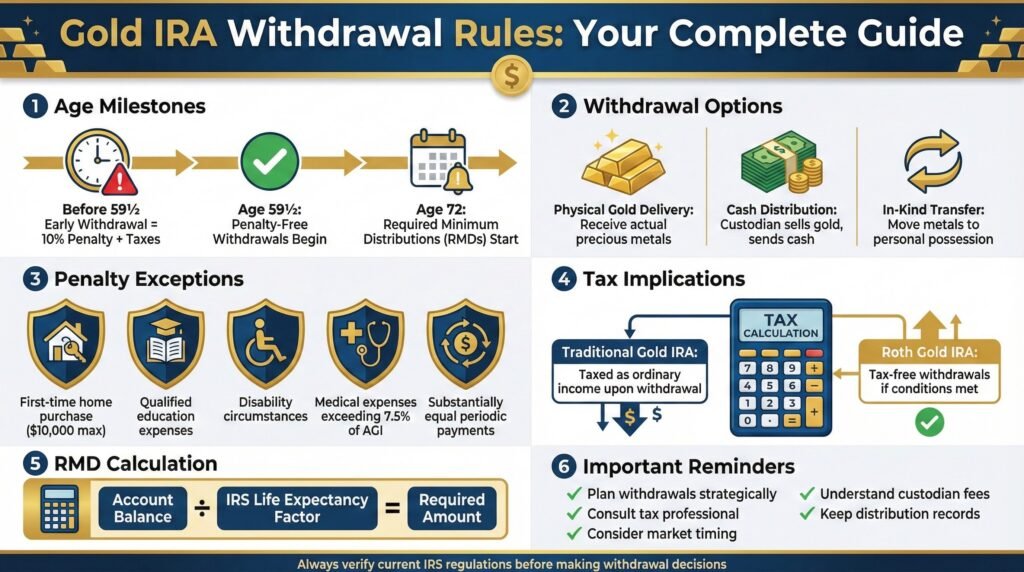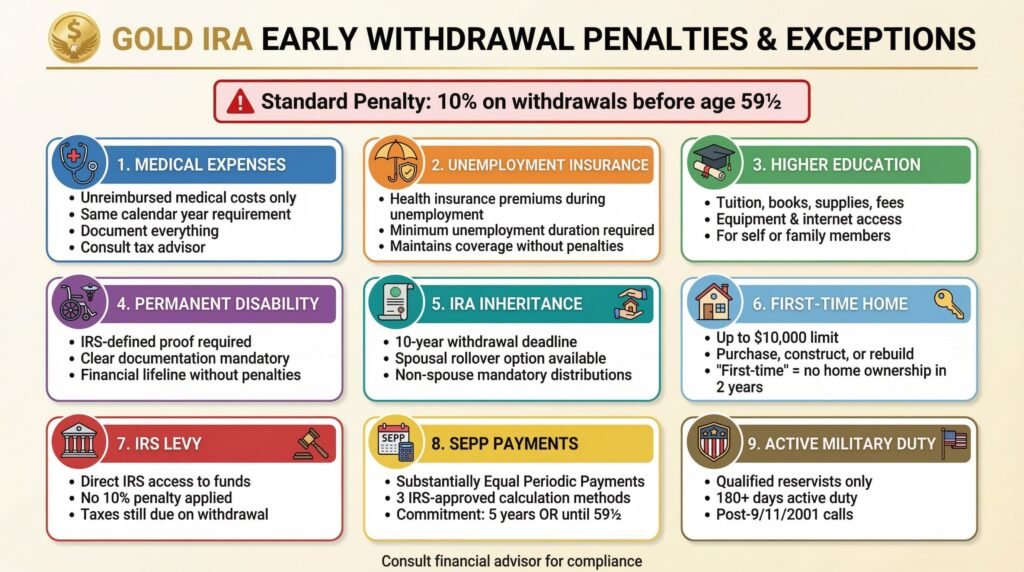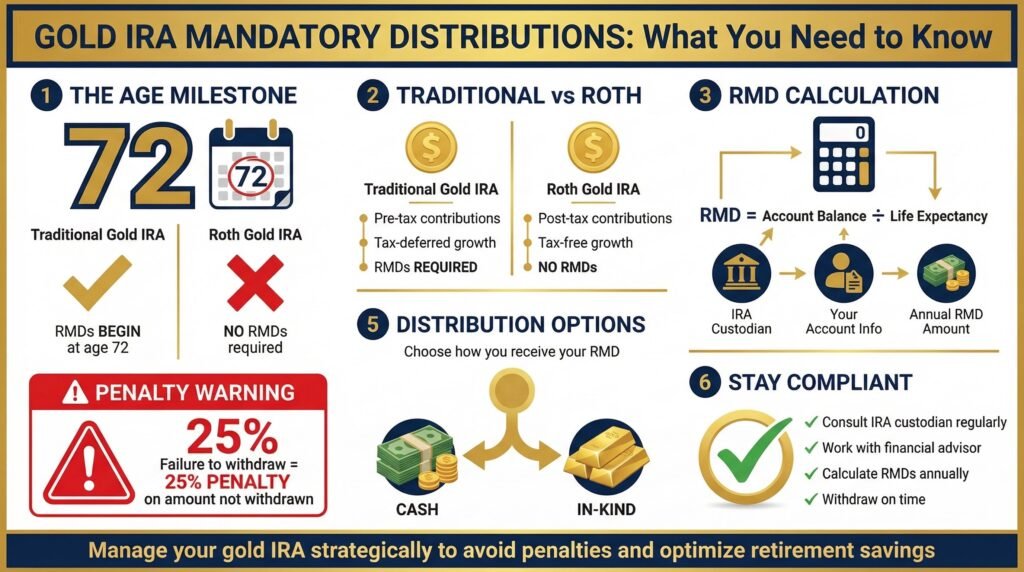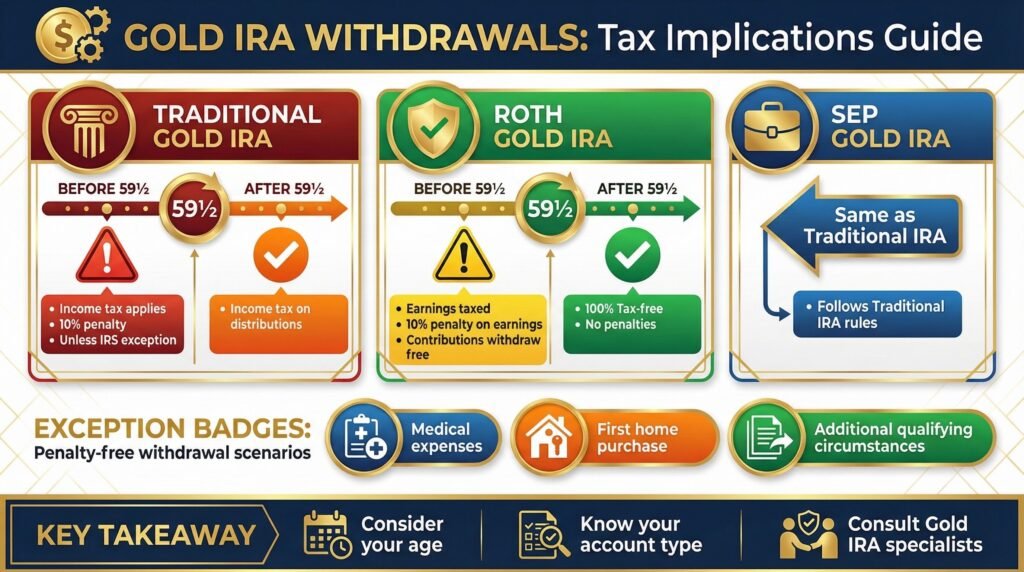Gold IRA Withdrawal Rules

When you consider withdrawing from your Gold IRA before hitting 59 ½, you’re facing a 10% penalty imposed by the IRS, except in cases like unreimbursed medical expenses, permanent disability, or active duty, where exceptions apply.
You should tread carefully, taking into account the financial implications and consulting a tax advisor for a comprehensive analysis of your specific situation.
Some of the main gold IRA withdrawal rules are for those over 72; starting withdrawals from a traditional Gold IRA is mandatory, with Roth IRAs exempt from this requirement.
Importantly, early withdrawals from a traditional Gold IRA are not only subject to income tax but also a penalty, whereas Roth IRAs offer tax and penalty-free withdrawals post-59 ½, underlining the importance of understanding the tax implications and choosing your distribution method wisely. To better understand how gold IRA withdrawal rules work, we cover:
-Early Withdrawal Penalties
-Mandatory Distributions
-Tax Implications Of Gold IRA Withdrawals
-Tips And Considerations For A Smooth Gold IRA Withdrawal
Early Withdrawal Penalties

When you’re considering an early withdrawal from your Gold IRA, it’s essential to understand the potential penalties and the specific exceptions that can mitigate them.
The IRS imposes a 10% penalty on distributions taken before age 59 ½, but exceptions exist for situations like unreimbursed medical expenses or permanent disability.
Navigating these rules requires a detailed analysis of your circumstances and the potential financial implications of making an early withdrawal.
Unreimbursed Medical Expenses
Facing immediate medical expenses not covered by health insurance, you can utilize a penalty-free withdrawal from your gold IRA, provided the medical expenses are paid within the same calendar year as the withdrawal.
This exception to early withdrawal penalties underlines the flexibility of gold IRAs in urgent financial situations.
Here are key points to remember:
-Ensure expenses are strictly for unreimbursed medical needs.
-Withdraw only the amount necessary to cover these expenses.
-Payments must be made within the same calendar year as the withdrawal.
-Document all transactions and medical expenses meticulously.
-Consult with a tax advisor to ensure compliance with IRS rules.
This strategic approach allows you to manage unforeseen medical expenses while preserving the integrity of your retirement savings.
Health Insurance Premiums During Unemployment
Utilizing your Gold IRA, you can access penalty-free early withdrawals to cover health insurance premiums during periods of unemployment, providing a financial lifeline in challenging times.
This exemption from early withdrawal penalties underlines the flexibility and protective measures built into Gold IRA regulations, tailored to support individuals during financial hardship. It’s crucial to understand the specific conditions under which this exception applies.
The IRS stipulates that to qualify, you must be unemployed for a minimum duration, which directly impacts your eligibility for this benefit. Navigating these rules requires a careful review of your employment status and the timing of your health insurance premium payments.
By leveraging this provision, you can maintain essential health coverage without compromising your long-term retirement savings, highlighting a strategic approach to managing your Gold IRA assets during unemployment.
Higher Education Costs
If you or your family members are embarking on higher education pursuits, you’ll find that certain costs can be offset by penalty-free withdrawals from your gold IRA, providing a financial cushion for expenses like tuition and textbooks.
The IRS permits these exceptions under specific conditions, making it a valuable option for managing higher education expenses without incurring the usual penalties associated with early withdrawals.
-Tuition: Direct costs for enrollment and attendance.
-Books and Supplies: Essential educational materials.
-Fees: Mandatory charges besides tuition.
-Equipment: Necessary items for coursework.
-Internet Access: For online courses and research.
Leveraging your gold IRA in this manner requires careful consideration of the rules and potential implications on your long-term retirement planning. It’s a strategic move to support educational goals while preserving the integrity of your retirement savings.
Permanent Disability
Navigating the complexities of a permanent disability, you’ll find that your gold IRA offers a financial lifeline without the usual early withdrawal penalties, provided you can demonstrate the required proof of impairment.
This exemption is crucial, especially in times of financial hardship due to disability. It’s important to understand that the IRS mandates clear documentation of disability, as defined under their guidelines.
Once this criterion is met, you’re allowed penalty-free access to your gold IRA assets. This provision aims to offer relief during challenging times without compromising your long-term financial security.
However, meticulous adherence to IRS requirements is essential to ensure that the exemption is applied correctly. Engaging with a knowledgeable custodian or financial advisor can facilitate this process, ensuring that you navigate these rules effectively and efficiently.
Receiving An IRA Inheritance
Inheriting a gold IRA presents a unique set of rules for penalty-free early withdrawals, a significant consideration for beneficiaries outside the immediate spouse of the deceased. When you’re navigating the complexities of receiving an IRA inheritance, it’s crucial to be aware of the specific guidelines that apply.
-Beneficiaries must withdraw all funds within 10 years of inheritance.
-Spousal beneficiaries have the option to roll over assets into their own IRA.
-Non-spouse beneficiaries are subject to mandatory distribution rules, regardless of their age.
-Missing the 10-year withdrawal deadline can result in heavy tax penalties.
-Consulting with a financial advisor is recommended to navigate these complex rules effectively.
Understanding these key points ensures you’re better prepared to manage your inherited assets wisely, avoiding unnecessary penalties and maximizing the inherited wealth.
Purchasing, Constructing, Or Rebuilding A Home
Understanding the specific guidelines for penalty-free early withdrawals from an IRA inheritance sets a solid foundation for exploring another significant opportunity: you can access up to $10,000 from your savings for purposes related to purchasing, constructing, or rebuilding a home without facing early withdrawal penalties.
This provision caters specifically to first-time homebuyers, offering a financial boost when acquiring a primary residence. It’s essential to interpret the term ‘first-time’ flexibly, as the IRS defines it as not having owned a home in the previous two years.
This exception underscores a strategic approach to IRA funds, enabling you to invest in a tangible asset while circumventing the typical 10% penalty. However, meticulous planning is crucial to ensure this withdrawal aligns with your broader financial goals and IRA regulations.
Fulfilling An IRS Levy
Facing an IRS levy presents a unique scenario where you can withdraw funds from your IRA without incurring the standard 10% early withdrawal penalty. When you’re subject to an IRS levy, this exception highlights the critical interplay between tax obligations and retirement savings.
-Direct Withdrawal: The IRS can directly access your IRA funds to cover your tax debts.
-No 10% Penalty: This specific instance bypasses the early withdrawal penalty.
-Tax Obligations: You’re still responsible for any taxes due on the withdrawal amount.
-IRA Custodian Notification: Your IRA custodian must be informed about the levy.
-Documentation: Proper documentation from the IRS is crucial to facilitate this process.
Understanding this exception is vital, ensuring you navigate the complexities of tax levies without unnecessary penalties.
Substantially Equal Periodic Payments
Exploring the option of Substantially Equal Periodic Payments (SEPP) offers a strategic approach to avoid early withdrawal penalties from your IRA, engaging with one of three IRS-approved methods to calculate the necessary withdrawals.
This method, while precise, necessitates a thorough understanding of the guidelines to ensure compliance and financial efficacy. By opting for SEPP, you’re committing to a series of calculated withdrawals that extend for either five years or until reaching the age of 59 ½, whichever is longer.
This approach not only mitigates the risk of incurring a 10% penalty but also demands a disciplined adherence to the chosen calculation method.
It’s imperative to meticulously plan these withdrawals, understanding that deviations or miscalculations could result in substantial financial repercussions.
Involvement In Active Duty
An often overlooked provision within IRS guidelines permits tax-free early withdrawals from your IRA if you’re a qualified military reservist called to active duty for a significant period. This exception is particularly relevant for those invested in a Gold IRA, where early withdrawals typically trigger a 10% penalty.
-Qualified Military Reservist: Must be called to active duty for more than 179 days.
-Active Duty Period: Active duty call must occur after September 11, 2001.
-Tax-Free Withdrawals: Avoids the standard 10% early withdrawal penalty.
-IRS Approval: This provision is explicitly recognized by IRS guidelines.
-Eligibility Verification: Documentation proving the call to active duty is required.
Understanding this exemption can significantly benefit military reservists by providing financial flexibility during periods of active service, without the punitive costs associated with early IRA withdrawals.
Working with a professional gold IRA company that understands the tax implications and rules can provide peace of mind.
Furthermore, a long-established and trusted company that can provide competitive prices, price transparency, reliable customer service, and security of your precious metals can take away all of the guesswork.
Depending on whether you are a high-net investor looking for the most competitive prices or require a lower investment minimum and affordable entry to the gold market, we have researched and reviewed our best 4 gold IRA and precious metal investment companies that meet those individual needs. Whether you prefer a gold IRA or owning the physical gold in your place of residence.
To learn more about the advantages of tax-deferred gold IRAs right now, click the banner below to access and download Augusta Precious Metals’ gold IRA checklist to make sure you are aware of all aspects of the gold IRA process:
Mandatory Distributions

Understanding mandatory distributions is crucial, as you must begin withdrawing funds from your traditional gold IRA at age 72, a requirement that doesn’t apply to Roth gold IRAs.
This rule ensures that after years of tax-deferred growth, the government receives its due taxes on your retirement savings.
Unlike Roth gold IRAs, where contributions are made post-tax, traditional gold IRAs benefit from pre-tax contributions, resulting in different rules for mandatory distributions.
The process of determining your required minimum distribution (RMD) is based on a formula that considers your account balance and life expectancy.
Your IRA custodian or plan administrator plays a pivotal role in calculating this amount, ensuring you’re withdrawing the correct sum annually to comply with IRS regulations.
Failure to meet your RMD requirements results in a steep penalty-25% of the amount that should have been withdrawn. Thus, it’s not just about ensuring you have sufficient retirement savings but also about strategically managing these savings to avoid unnecessary penalties.
RMDs from traditional gold IRAs can be taken in cash or through in-kind distributions, where you receive the physical gold equivalent to your RMD value.
This flexibility allows for personalization in how you access your retirement funds, keeping in mind the ultimate goal of fulfilling the mandatory distribution requirements set forth by the IRS.
As you navigate the complexities of mandatory distributions, it’s essential to stay informed and proactive in managing your gold IRA.
This entails regular consultations with your IRA custodian and possibly a financial advisor to ensure your retirement strategy remains on track, compliant, and optimized for your financial goals.
Tax Implications of Gold IRA Withdrawals

When considering a withdrawal from your Gold IRA, it’s crucial to grasp the potential tax ramifications that vary depending on the account type you’ve selected. Understanding these implications is key to making informed decisions that align with your financial goals and retirement planning strategy. Here’s what you need to know:
-Traditional Gold IRA: Withdrawals before age 59 ½ are considered non-qualified distributions and are subject to both income tax and a 10% early withdrawal penalty, unless an IRS exception applies.
-Roth Gold IRA: Withdrawals after age 59 ½ are tax and penalty-free. However, early withdrawals of earnings are subject to taxes and a 10% penalty, with certain exceptions allowing for penalty-free withdrawals.
-SEP Gold IRA: These accounts follow the same rules as Traditional Gold IRAs, with penalties for early withdrawals and taxes applied to distributions.
-Early Withdrawal Exceptions: Both Traditional and Roth Gold IRAs offer exceptions to the early withdrawal penalty for qualifying circumstances, such as unreimbursed medical expenses or buying a first home.
-Tax-Free Contributions: Contributions to Roth Gold IRAs are made with after-tax dollars, meaning you won’t be taxed again upon withdrawal after reaching the qualifying age.
Navigating the tax implications of Gold IRA withdrawals requires careful consideration of the account type, your age, and the reason for the withdrawal.
Whether you’re planning a retirement strategy or facing an immediate financial need, understanding these rules can help you avoid unnecessary penalties and optimize your tax situation. Working with a gold IRA company that has a working knowledge of the withdrawal rules can save a great deal of time and stress.
Best Gold IRA for Low Minimum Investment
Tips And Considerations For A Smooth Gold IRA Withdrawal
Having explored the tax implications of Gold IRA withdrawals, let’s now focus on strategies to ensure your withdrawal process is as efficient and beneficial as possible.
First, you must initiate the distribution phase by submitting a distribution request form to your gold depository. This step is foundational in outlining your preferred method of distribution, whether it be in the form of bullion bars, coins, or liquidated cash.
Opting for cash distribution over non-cash delivery streamlines the process, providing immediate funds and reflecting the current market value of your assets without the waiting period tied to physical possession.
For those with a Traditional IRA, remember that distributions are taxed based on your income. Therefore, it’s imperative to calculate the necessary withdrawal amount to cover any tax liabilities unless you’re settling these taxes separately.
Given the mandatory distribution requirements starting at ages 59 ½, 70 ½, or 72, depending on your birth year, this planning step cannot be overlooked.
Conversely, a Roth IRA offers a tax-free distribution advantage, relieving you from the burden of selling additional gold to meet tax obligations. This feature underscores the importance of choosing the right IRA type based on your long-term financial goals.
Lastly, to sidestep potential fines, decisively finalize your distribution method after weighing its benefits, especially when filing taxes. If opting for physical gold, consider the implications on your investment’s tax-deferred status once it exits the IRA.
Thoroughly understanding these facets ensures you’re better positioned to manage your distributions effectively, maximizing the benefits of your Gold IRA.
To easily avoid many of the pitfalls of gold IRAs, click the banner below to receive a free gold IRA checklist from Augusta Precious Metals. Get started today
Conclusion
Navigating Gold IRA withdrawal rules is key to preserving your wealth without facing hefty penalties or taxes. Always consider early withdrawal penalties and mandatory distribution ages to avoid unnecessary costs.
Remember, the tax implications vary, especially between traditional and Roth Gold IRAs. By carefully planning your withdrawals and leveraging exceptions, you can ensure a smoother process.
It’s about strategic timing and understanding IRS regulations to maximize your retirement savings while maintaining financial security.
If you have 100k in savings to protect and want to take advantage of the best gold prices and lifetime customer support, attend a free gold and silver educational web conference hosted by Augusta Precious Metals. Secure your place today by clicking the banner below.
If you have 100k in savings to protect, attend a gold investment educational webinar hosted by Augusta Precious Metals. Tap the button below:
Obtain a gold IRA guide and talk to a broker





Gold IRA FAQs

Adam ONeill
Author, lifelong investor, and creator of PreciousMetalsInvestmentPortfolio.com



